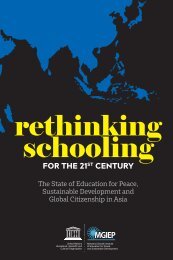Flourishing and Education
This short paper provides a definition of human flourishing, education, learning, teaching and student evaluation, more commonly known as student assessment. These definitions and their relationship with each other set the context of the International Science and Evidence based Education (ISEE) Assessment. The ISEE Assessment, an initiative by the UNESCO Mahatma Gandhi Institute of Education for Peace and Sustainable Development (MGIEP), was designed to provide the science and evidence support to UNESCO’s Futures of Education initiative.
This short paper provides a definition of human flourishing, education, learning, teaching and student evaluation, more commonly known as student assessment. These definitions and their relationship with each other set the context of the International Science and Evidence based Education (ISEE) Assessment. The ISEE Assessment, an initiative by the UNESCO Mahatma Gandhi Institute of Education for Peace and Sustainable Development (MGIEP), was designed to provide the science and evidence support to UNESCO’s Futures of Education initiative.
You also want an ePaper? Increase the reach of your titles
YUMPU automatically turns print PDFs into web optimized ePapers that Google loves.
The ISEE Assessment<br />
The International Science <strong>and</strong> Evidence based <strong>Education</strong> (ISEE) Assessment is an initiative<br />
of the UNESCO Mahatma G<strong>and</strong>hi Institute of <strong>Education</strong> for Peace <strong>and</strong> Sustainable<br />
Development (MGIEP), conceived as its contribution to the Futures of <strong>Education</strong> process<br />
launched by UNESCO Paris in September 2019. In order to contribute to re-envisioning the<br />
future of education with a science <strong>and</strong> evidence-based report, UNESCO MGIEP embarked<br />
on an ambitious project of the first-ever large-scale assessment of the knowledge on<br />
education.<br />
The overall goal of the ISEE Assessment is to pool the multi-disciplinary expertise on<br />
educational systems <strong>and</strong> reforms from a range of stakeholders in an open <strong>and</strong> inclusive<br />
manner <strong>and</strong> undertake a scientifically robust <strong>and</strong> evidence-based assessment that can<br />
inform education policy making at all levels <strong>and</strong> scales. It is not to be policy prescriptive but<br />
to provide policy relevant information <strong>and</strong> recommendations to improve education systems<br />
<strong>and</strong> the way we organize learning in formal <strong>and</strong> non-formal settings. It is also meant to<br />
identify information gaps <strong>and</strong> priorities for future research in the field of education.<br />
In the education sector, the term assessment generally refers to activities used to measure<br />
student progress. Going beyond this narrow notion of education assessment, <strong>and</strong> drawing<br />
lessons from the IPCC Assessment Reports <strong>and</strong> other scientific environmental assessments<br />
(such as Millennium Ecosystem Assessment <strong>and</strong> IPBES), UNESCO MGIEP aspires to initiate a<br />
scientifically credible, legitimate, relevant <strong>and</strong> inclusive process that will assess the state<br />
of education as a complex system <strong>and</strong> its role in achieving sustainable <strong>and</strong> peaceful<br />
societies.<br />
The ISEE Assessment uses the 1996 Delors report’s four pillars of education Learning to be,<br />
Learning to know, Learning to do <strong>and</strong> Learning to live together as the evaluative<br />
benchmarks <strong>and</strong> the lens of “what”, “where”, “when” <strong>and</strong> “how” we learn <strong>and</strong> teach. The<br />
assessment is designed along three Working Groups: (1) Human <strong>Flourishing</strong>, <strong>Education</strong><br />
<strong>and</strong> Learning; (2) <strong>Education</strong>, Learning <strong>and</strong> Context; <strong>and</strong> (3) Learning Experience. In<br />
addition, there is a technical group on Data <strong>and</strong> Evidence. The ISEE Assessment Report is<br />
expected to be released in November 2021.<br />
Contact: ISEE Assessment Secretariat<br />
issea@unesco.org<br />
9<br />
Meaning(s) of Human <strong>Flourishing</strong> <strong>and</strong> <strong>Education</strong><br />
A Research Brief by the ISEE Assessment<br />
- An Initiative by UNESCO MGIEP

















